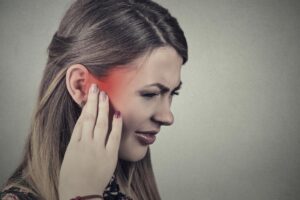Your partner constantly complains about your snoring. You feel exhausted no matter how much sleep you get or how much coffee you drink. You even catch yourself falling asleep on the job. Sound familiar? You could be one of the 20 million Americans plagued with sleep apnea. And in reality, that number is probably much higher. Many people aren’t aware of the warning signs of sleep apnea and never get a diagnosis. And the consequences of that could be fatal.
Sleep apnea is often thought of as a benign condition. Okay so you snore — what’s the big deal? Well, when you have sleep apnea, your airway is obstructed, causing interrupted breathing, sleep deprivation. and lack of oxygen. Undiagnosed cases can lead to heart disease, high blood pressure, diabetes, and even erectile dysfunction. That’s why it’s important to get treated as soon as possible.
So before you brush off the possibility that you could have sleep apnea, consider these dangerous warning signs:
You Snore Loudly
We aren’t talking about just some heavy breathing. If your snoring is so loud that it disturbs your household or even awakens you from your sleep, you may have sleep apnea. Relaxed throat muscles can block your airway, unleashing that loud, monstrous growl that keeps that whole house awake at night. Do yourself (and your loved ones) a favor and pay a visit to your doctor.
You Gasp or Choke in Your Sleep
Gasping for air in the middle of the night isn’t normal; it’s a dangerous warning signal. If your throat muscles become too relaxed, your airway will become blocked to the point of choking. And if you’re a deep sleeper, you may not even notice yourself doing this. Ask your partner or record yourself overnight to verify if you have this symptom.
You Stop Breathing Periodically Throughout the Night
You may not be aware of this, but people with sleep apnea commonly hold their breath while they sleep. Just like with gasping, it may be a good idea to record yourself or ask your partner if they’ve noticed you doing this.
You Wake Up with Headaches, a Sore Throat and/or Sweat
Between the snoring, gasping and breath-holding, it’s no surprise that you’ll wake up feeling hungover. Inconsistent breathing will deprive you of oxygen, leading to night sweats, morning headaches, and a sore, dry throat. These symptoms are also associated with other conditions so it’s always a good idea to have an ENT confirm a diagnosis.
You’re Extremely Exhausted
When your sleep is disturbed and your body deprived of oxygen, exhaustion is sure to follow. The sleepiness associated with sleep apnea is often intense. It’s not the same kind of tiredness you experience from staying up too late to binge-watch your favorite show. It’s actually not unusual for someone with sleep apnea to fall asleep while performing a task, watching tv, or driving a car.
You’re Not Yourself
Even if you think you’re getting a full night’s sleep, you’re not. And sleep deprivation will negatively impact your overall well-being. You may have this vague feeling of just not being yourself. Perhaps you’re irritable, unfocused, unproductive, or even depressed. This will, in turn, affect your relationships, job, and mental health.
Ent Endoscopy Centre, Indore Understands the Warning Signs of Sleep Apnea
If you think you could have sleep apnea, schedule an appointment with one of our ENTs to get a proper diagnosis. We will start with an examination of your sleep problems as well as a physical inspection of your airway. Once we arrive at a diagnosis, we can build a treatment plan based on the severity of your sleep apnea. Start breathing and sleeping better today.



